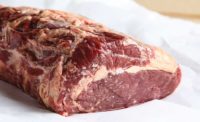Growth Opportunities | Premium Meat
Consumers Seeking Claims
Meat products with the desired attributes are premium products in the marketplace.

Courtesy of Verde Farms.
Meat products have become increasingly complicated as the desires of consumers continue to grow and change. At one point — not too long ago — it was newsworthy when a company included the word “natural” on their label to describe their steak, chicken breast or hot dog. Consumers are savvier than ever before, that kind of claim doesn’t work like it once did. What does “natural” even mean, anyway?
The meat industry itself is generally a commodity industry, but the premium category, home to many types of claims-based meat products, is an exciting and growing market. “Claims-based meats” refers to those products that offer specialized attributes, such as organic, natural, free-range, air-chilled, GMO-free, or Paleo-friendly. The processors who cater to those customers have interesting products, a keen awareness of trends and, most importantly, quality products.
Verde Farms, which has been at the forefront of the grass-fed beef movement in the United States for the last 15 years, has had to scale up its operations to keep up with the demand for its products. In the last couple of years, the company has expanded its operations to accommodate the consumer demand. It has broadened its product range, adding further processed foods like meatballs and sausages to its beef cuts and ground beef. It has bulked up its upper management team to keep up with the growth. It has opened its first processing facility.
“We’ve always been interested in being more than just a meat company and a commodity player. We’ve always been interested in trying to understand what the consumer needs are and connecting with them in a deep and emotional manner,” says Dana Ehrlich, CEO and founder of the company.
Ehrlich says that the company has done considerable research to understand who its target customer is and what they want. The consumer who is seeking out claims like better-for-you attributes, animal welfare practices and sustainability promises are also seeking out organic and grass-fed items as well. In fact, Ehrlich referred to a part of the Power of Meat presentation, held during the Annual Meat Conference in early March, which indicated that organic and grass-fed meat sakes were enjoying double-digit sales growth.
As a smaller company that focuses exclusively in the grass-fed market and offers several organic products, Verde offers an advantage over a larger company that seeks to capitalize on fast-growing niches.
“If you have a meat commodity and a large corporation that says, ‘Oh, now there’s a market for grass-fed. We’re going to get some grass-fed beef and throw a label on it,’ It’s a very different perspective than how we approach things,” Ehrlich says.
Pete Lewis, Verde’s vice president of marketing, notes that those claims often aren’t enough, as there are many companies that are entering these niches.
“The differentiation is really having, both to the trade and to the consumer, a meaningful and relevant brand, and that brand represents a bundle of different things,” he says, adding that Verde actively communicates with consumers through social media, in-store signage, demos and radio advertisements. The company also works with the store’s staff to help them understand the differences of Verde’s products and other beef.
PRE Brands, a Chicago-based grass-fed brand, has so many claims that it can place on its packaging that it has to be choosy with what it includes.

“Right now, what we find most consumers are looking for is non-GMO Project Verified. They are trained to look for that in the center of the store, and now they are starting to look for it in the perimeter,” explains Nicole Schumacher, chief marketing officer for PRE Brands LLC. “We were one of the first branded beef companies that put it on the front of our label.”
The company’s packaging also boasts its approvals with a number of dietary trends. Its products are Keto Certified, Whole30 Approved and Certified Paleo. Being grass-fed, PRE’s steaks and ground beef would satisfy these dietary needs, but the company wanted to get those certifications noted on the packaging for the ease of the consumer.
“Putting that seal on there gets that recognition from the consumer who is shopping and has 15 seconds to look and say, ‘I am doing Paleo or Whole30.’ They don’t have to do the research; we give it to them,” Schumacher says.
Schumacher adds that the company’s most-requested claim was to add halal certification to the company’s products. All of PRE’s beef comes from Australia or New Zealand and met the needs of halal certification, but the company’s former processor was not certified. Since moving to a halal-certified manufacturer, Schumacher says that the company was able to satisfy their customer’s needs and add that certification.
“The consumer demographic is constantly changing. We try to be consumer-forward, and we want to help our consumers shop more easily for the attributes that they value,” she adds.
Ultimately, there is a cost that goes into earning the claims on a label or a company’s website, whether from the USDA or a third party. Those claims-based meats have a premium price, which brings an added challenge when competing against cheaper products. Schumacher does believe that those claims add value for the consumers who wants them.
“I think people understand that, with quality, you have to be able to prove it,” she says, adding that the additional steps the company takes, such as recipes on its website, in-store signage and participation in apps like ibotta help to establish PRE as a trusted brand.
“Teaching [consumers] how to cook a product the right way and being able to help them get to their next meal plan and provide them with the tools to cook at home, I do think there is value to that,” adds Schumacher. IP
Looking for a reprint of this article?
From high-res PDFs to custom plaques, order your copy today!







